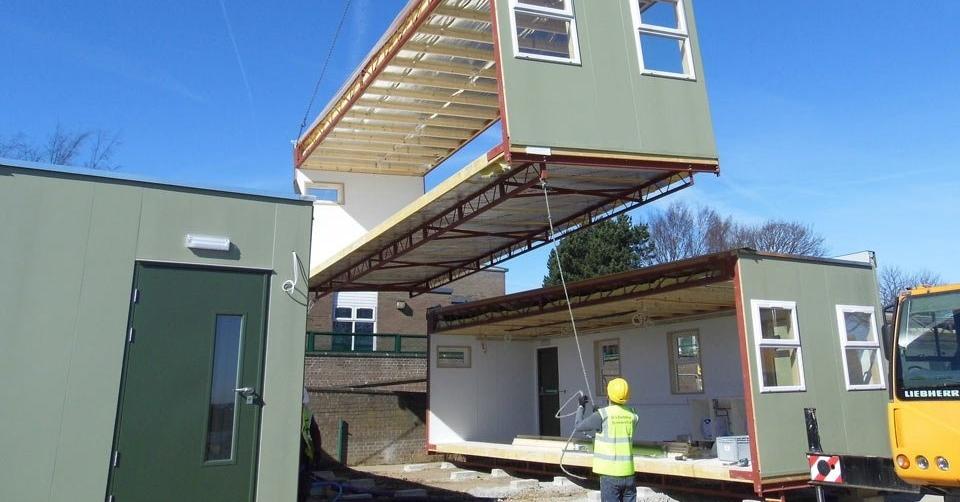The popularity of modular construction as an efficient and cost-effective alternative to traditional building methods is on the rise. With the increased adoption of modular buildings, there has been a surge in inquiries surrounding this innovative construction approach.
Paragon Space, a reputable manufacturer of modular buildings located in Hull, is well-equipped to provide answers to some of the most frequently asked questions regarding modular construction.
What is modular construction?
Modular construction involves the creation of individual units, referred to as modules, within a controlled factory environment. These prefabricated modules are then transported to the designated site and assembled by skilled professionals to form a complete modular building.
This method ensures construction of high quality while minimising on-site work. Modules can be interconnected in various configurations to suit specific design requirements, accommodating single-story or multi-story structures.
How does modular construction differ from traditional building?
Conventional building follows a linear process where construction materials are transported to the site, and the structure is assembled on-site from the ground up. Modular construction, on the other hand, employs around 70% of the construction process within a controlled factory setting. Prefabricated modules are transported to the site and assembled to create the modular building.
Despite these distinct approaches, both traditional and modular buildings adhere to the same building regulations.
What materials are utilised in modular buildings?
Modular buildings are typically constructed using a wooden frame fitted with drywall. This lightweight construction contrasts with traditional structures that employ materials like bricks and mortar, resulting in faster installation times.
What is the timeframe for completing a modular building?
The duration of modular building projects varies among manufacturers. Paragon Space, for instance, typically delivers modular buildings within 4-6 weeks.
What is the lifespan of modular buildings?
Contrary to a common misconception, modular buildings are not always temporary structures. They are classified as permanent and can endure for more than 25 years with proper care and maintenance, rivalling the longevity of traditional buildings.
Can I relocate my modular building?
A significant advantage of modular buildings is their portability. They can be moved within your site or to an entirely new location. Thanks to their modular nature, these buildings can be disassembled, transported, and reassembled in a matter of days. However, relocating must be performed by trained professionals.
When relocating a modular building, the structure is disconnected from utilities, dismantled, and divided into sections. These sections are then lifted onto a trailer using a crane and transported to the new site by lorry. Upon arrival, the modules are reassembled and reconnected to utilities.
Is planning permission required for a modular building?
Yes, any structure intended for use beyond 28 days or exceeding 100m² requires planning permission. Some exceptions apply to extensions of existing buildings.
When acquiring a modular building, your supplier can assist with the planning application process. Consulting your local Planning Authority is also recommended for further guidance.
What are the advantages of modular buildings?
Modular construction offers numerous benefits beyond cost-effectiveness and efficiency. While these are key advantages, several other merits deserve consideration.
Cost-effectiveness: Modular buildings are notably more budget-friendly than traditional structures. Factory-based construction reduces on-site expenses and transportation costs.
Swift installation: Using factory-built modules minimises on-site construction time, accelerating installation and reducing labour costs.
Sustainability: Modular buildings are ecologically sound. Factory construction reduces waste, with excess materials being repurposed. Moreover, reduced transportation lessens CO2 emissions. Rapid installation minimises disruption to local surroundings, including wildlife. Energy efficiency is also prioritised, featuring quality insulation, HVAC systems, and advanced sealing techniques that decrease environmental impact and energy expenses.
Quality control: Factory construction ensures superior product quality, an advantage not easily achieved on open construction sites, influenced by factors like weather.
Minimal disruption: The efficient installation of modular buildings limits disturbance to the surroundings. The impact, whether it’s wildlife, residential areas, or other on-site zones, is minimised. For instance, installing modular buildings in a hospital for capacity expansion will maintain ongoing operations.
Tailored solutions: Modular buildings find application in diverse sectors, prompting suppliers to offer customised solutions. Whether it’s a school requiring science classrooms equipped with specific amenities or other specific needs, modular buildings are adaptable.
What modular building options exist?
Modular buildings can be procured brand new with tailored specifications, acquired as used structures, and refurbished to meet your needs.
Paragon Space, headquartered in Hull, is a respected modular building manufacturer serving the UK and Europe. We offer tailor-made modular building solutions to fulfil a wide range of requirements. Explore our modular building offerings, or contact our friendly team today.
